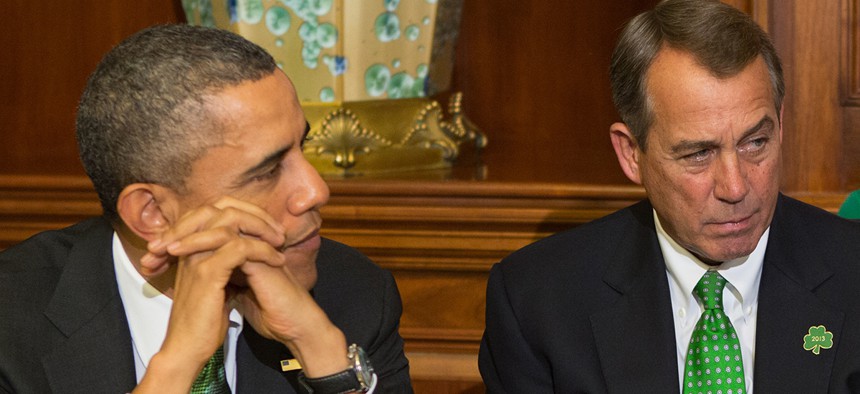
Office of the Speaker of the House
Republicans to Test White House's Obamacare Confidence
The GOP is working on plans to put the administration in a tough spot after the health care law’s big legal victory.
With Obamacare preserved by the Supreme Court, the White House is sounding confident. "The Affordable Care Act is here to stay," President Obama said after the ruling. Time to move on.
But congressional Republicans are not going to leave the law alone. They will keep trying to chip away at it and pick off unpopular or controversial pieces of the Affordable Care Act. For the White House, that means at some point it will have to decide whether its renewed swagger means it can reject anything and everything the GOP comes up with, whatever the circumstances.
Because Congress still has its wish list: The medical-device tax that helps pay for the ACA has become perhaps Republicans' top repeal target. They have also long wanted to nix a Medicare advisory board created by the law. And if the White House won't agree to those provisions on their own, conservatives are floating the idea of attaching them to must-pass bills to test the administration's resolve. Another government shutdown over Obamacare suddenly isn't so far-fetched.
Coming off their legal triumph, Obama and top administration officials are saying all the right things: We're willing to consider changes—if they make sense to us.
"I think you should be open to other ideas," the president said last week, in a version of the line he has used on health care legislation for the previous six years. "But the bottom line is: What works? What works? And if Republican legislators have better ideas, they should present them. But they have to be realistic. They have to be meaningful."
But anything that would signify a real political win for Republicans has, at least so far, been off the table. The White House has threatened to veto two House-passed bills that would repeal the medical-device tax and Medicare advisory board. If Congress decides to use the budget reconciliation process to repeal major parts of the law, that's obviously a nonstarter, too.
Health and Human Services Secretary Sylvia Mathews Burwell told reporters recently that the agency would evaluate any proposed Obamacare changes by four criteria: "Does it improve affordability? Does it improve access? Does it improve quality? And how does it interact with the economy?"
Repealing the medical-device tax would add $24 billion to the deficit over 10 years, and Burwell asserted that the tax has not had any measurable negative impact on the medical-device industry. So it didn't qualify in the administration's eyes—though 46 Democrats supported its repeal in the House.
Burwell offered expanding small-business tax credits as an example of administration-approved improvements to the law. The administration floated the idea in its latest budget request, proposing increasing eligibility for the tax credit to businesses with as many as 50 employees, up from 25.
That's probably not the kind of change that the rank-and-file of the Republican caucus had in mind. But those changes that Republicans do have in mind are still confronted with the threat of Obama's veto pen.
"The administration is certainly empowered by the Supreme Court decision and will pursue a message that the ACA is the law of the land," said Elizabeth Carpenter, director of government relations at Avalere Health, an independent consulting firm.
It will be easy for Obama to strike down individual bills, especially now that the nation's high court has upheld Obamacare's essential subsidies. The White House was mum before the King v. Burwell decision about what its strategy would be had the Supreme Court struck down the subsidies, and so it may never be known what Obama might have been willing to give up to Republicans had he lost the lawsuit.
But what if the GOP instead tries to attach anti-Obamacare provisions to must-pass legislation?The Wall Street Journal reported Monday that Republicans were considering trying to pass medical-device-tax repeal as an amendment to an appropriations bill.
Would the White House still maintain absolute opposition to rolling back a relatively inconsequential part of the law, like the device tax, if a partial government shutdown were on the line?
Carpenter isn't so sure, noting that the administration has been willing to sacrifice parts of the Dodd-Frank financial-reform law to get spending bills passed. "At some point, they're going to need to pick their battles," she said.
"There will have to be a political and policy calculation: What is the public perception of some of this?" she said. "Some things—like tax repeals, repeal of the [Medicare advisory board]—to the normal person, it's like, 'You're shutting down the government over that?' "
The White House is maintaining its poker face. A spokesperson declined to comment.






